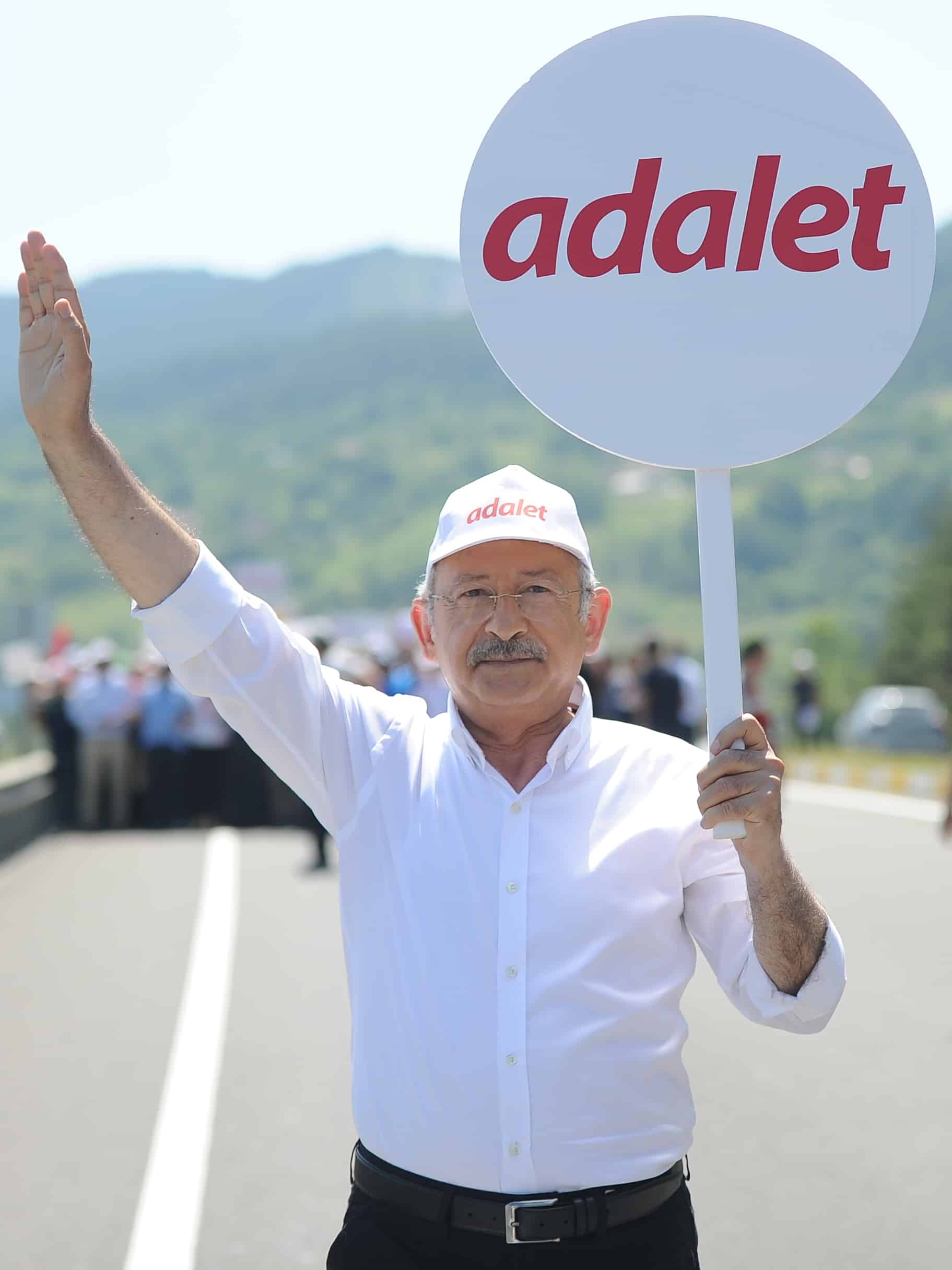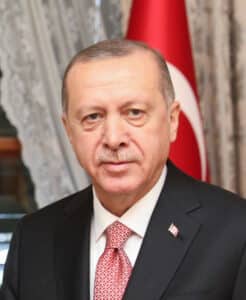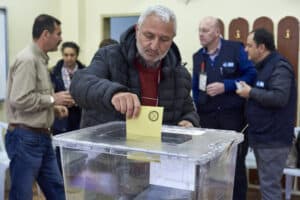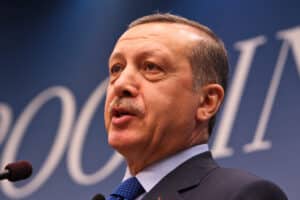Kemal Kilicdaroglu during his 432-kilometer protest march, summer 2017. Source: Wikimedia Commons
While having barely recovered from February’s devastating earthquake, Turkish society has to prepare for the upcoming presidential and parliamentary elections, now scheduled on May 14. Kemal Kilicdaroglu – the longtime leader of the social democratic CHP – has been chosen as ‘champion’ of the opposition’s six-party Nation Alliance to challenge President Erdogan. What can be expected of Kilicdaroglu and what are his chances of ending the AKP’s twenty-year reign? Polls are suggesting a tight and unpredictable race.
Aksener’s U-turn
The past week has been rather eventful for Türkiye’s ‘Table of Six’ – a six-party opposition alliance including parties from left to right – as on Friday 3 March five out of six parties agreed to naming Kemal Kilicdaroglu the common candidate for May’s election. Meanwhile, the right-wing IYI Party – led by Meral Aksener – decided to leave the Table of Six following the decision.
“I regret to say that The Table of Six has lost the ability to represent the will of the nation”, said Aksener, while also calling upon two of Kilicdaroglu’s potential rivals within the CHP-party to join in her resistance. These potential rivals – Istanbul Mayor Ekrem Imamoglu and Ankara Mayor Mansur Yavas – are commonly seen as more charismatic than Kilicdaroglu and have higher approval ratings among the electorate.
That did not conclude the drama, however, as the IYI party made a dramatic U-turn at the last moment. Having been approached by Imamoglu and Yavas, Aksener agreed to return to the Nation Alliance on one condition: Imamoglu and Yavas both have to run as Vice Presidents to Kilicdaroglu. And so it was agreed. In the event of a Nation Alliance win, Kilicdaroglu will become President with two Vice Presidents by his side.
The story of ‘Gandhi Kemal’
Although Kilicdaroglu comes from very humble beginnings, good school performances made it possible to start a three-decade career in the ministries of Finance and Social Affairs. Excited by his report on the prevention of corruption, the CHP recruited Kilicdaroglu after his retirement. He was elected to parliament in 2002.
In Ankara, Kilicdaroglu gained significant popularity by raising corruption allegations against prominent figures in Erdogan’s AKP. While losing an election to become Mayor of Istanbul in 2009, Kilicdaroglu was named chairman of the CHP in 2010. In 2017, Kilicdaroglu made the headlines as he undertook a 432-kilometer walk to protest the controversial prison sentence of a fellow party member. This gained him the nickname of ‘Gandhi Kemal’, for the walk’s similarity to Gandhi’s Salt March in 1930.
After over a decade of chairmanship, Kilicdaroglu is a respected figure in anti-Erdogan Türkiye, particularly praised for his continued efforts to unite a great variety in political movements against Erdogan. Furthermore, the CHP has managed to oust the AKP from power in cities such as Istanbul and Ankara under his leadership. Despite this, however, the CHP has not achieved significant success in national elections during the past decade.
Unusually tight elections ahead
It is this lack of national feats against the AKP that has resulted in a somewhat dissatisfied response in the opposition camp, as well as Kilicdaroglu’s modest reputation. “His speeches are boring. He is boring. The issue will come down to, will you vote for Erdogan or not?”, according to a Turkish political scientist.
From a strategic point of view, however, the choice for Kilicdaroglu over the more popular Imamoglu and Yavas can be explained, for the latter two are vulnerable in other aspects: Imamoglu is being threatened by a controversial lawsuit and Yavas seems to be unable to secure support from pro-Kurdish ally HDP. By getting both men ‘on the ticket’, the Table of Six can profit from their popularity while decreasing the risk of being politically decapitated during the presidential race.
Moreover, President Erdogan – despite his over two decade-reign – seems more vulnerable than ever. Even before February’s earthquake, polls were all suggesting a very tight presidential race because of the skyrocketing inflation harassing Turkish society. Now – because of the government’s slow response to the earthquake – the anti-Erdogan movement is getting unprecedented support, forcing Erdogan to issue a formal apology.
Others have criticised Erdogan’s government for its role in constructing non-earthquake resistant apartment blocks, which collapsed on a large scale during the earthquake. Kilicdaroglu – in the immediate aftermath of the earthquake – blamed Erdogan for failing to tackle the corruption in the construction sector: “If there is one person responsible for this, it is Erdogan”.
Rewriting Erdogan’s legacy
The Nation Alliance’s extensive election program vows to make the legacy of two decades of Erdogan undone.
First and foremost, the Table of Six wants to re-establish the parliamentary democracy in Türkiye after the Erdogan-instigated switch to a presidential system in 2017. This would bring back the position of Prime Minister. Other measures include the return to independence of the central bank, improving ties with the West and ensuring the independence of the judiciary.
While Erdogan’s grip on Turkish politics remains unabatedly strong, aggregating crises seem to have unprecedently weakened the President’s position. In terms of momentum, it is ‘now or never’ for the Table of Six to end Türkiye’s descent into autocracy.
Author: David Groenen



